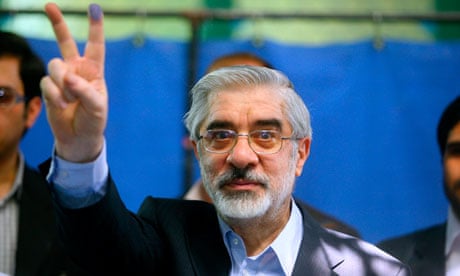Iranian opposition leaders Mir Hossein Mousavi and Mehdi Karroubi have seen an improvement in the conditions of their house arrest as hopes grow for their release.
Since Hassan Rouhani took office as Iran's new president last month the two men, who have been held for more than two years without being put on trial, have been treated better by the security guards and allowed more frequent family visits.
Karroubi's son, Mohammad Taghi, told the Guardian on Wednesday that both leaders have been dealt with in a positive fashion recently as news emerges that Iran's supreme leader, Ayatollah Ali Khamenei, has agreed that the country's supreme national security council can decide on their fate.
"The supreme leader has agreed for the council to handle the issue regarding their house arrests," he said. "We have received this news from a reliable source."
Mousavi and Karroubi, both former presidential candidates who alleged the results were rigged in Iran's 2009 election, were placed under house arrest in mid-February 2011 when they called for street protests in solidarity with pro-democracy movements in Egypt and Tunisia. Hardliners in Iran refer to the two as leaders of "sedition".
Mousavi is currently held in his own house in Tehran along with his wife, Zahra Rahnavard, also an outspoken critic, while Karroubi has been removed from home and taken to a house belonging to security officials. Karroubi's wife, Fatemeh, who was also placed under house arrest, has since been released.
Both men are suffering from various medical complications partly due to their age: both of them are over 70 and have been taken to hospital in recent months. Mohammad Taghi Karroubi said doctors trusted by the leaders' families have recently been allowed to examine them, unlike in the past when only doctors chosen by the authorities were permitted to treat them.
Increased optimism about the leaders' release also stem from the appointment this week of Ali Shamkhani, a moderate, to head the supreme national security council, which will decide on the matter of the house arrests.
On Tuesday Rouhani appointed Shamkhani, a former defence minister under reformist president Mohammad Khatami, as the security council's new chief. Shamkhani refused to condemn Mousavi and Karroubi after 2009 and is believed to be moderately sympathetic to the reformists.
Public demands for the leaders' release has heightened since Rouhani's victory in Iran's election this year, with senior politicians including Khatami and Ali Akbar Hashemi Rafsanjani highlighting their cases. Hardline politicians have signalled that any decision on their situation rests in the hands of Khamenei.
Despite the developments, Mohammad Taghi Karroubi said he did not think the authorities would release his father any time soon unless they decided to release other political prisoners as well. Earlier this year six prominent human rights organisations urged Tehran to end the "arbitrary" house arrests of the two veteran politicians.

Comments (…)
Sign in or create your Guardian account to join the discussion